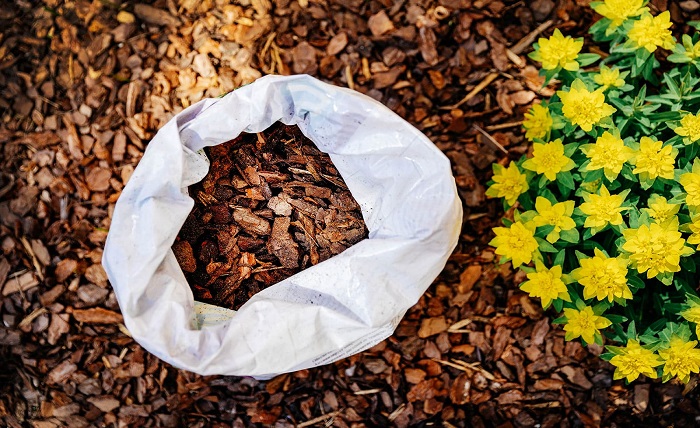Top 5 Mistakes to Avoid When Mulching Your Garden

Are you planning to mulch your garden to improve plant growth? Do you want to nurture every seed or plant in your garden properly? If yes, you must avoid mulching mistakes that can ruin your gardening efforts.
It is true that the mulch serves as a protective layer on the soil, but it can become harmful if used inappropriately. So, if you want to make the most of the mulching, you must not commit the blunders that many newbies and even some experts do.
In this guide, we will discuss the 5 most common mulching mistakes that you must avoid to keep your garden healthy. We will also provide you with helpful suggestions to prevent each faulty approach. So, let’s get started.
1. Over-Mulching
Over-mulching is the top pitfall homeowners often fall victim to. This practice involves spreading unnecessary mulch material on the soil. This mistake leads to increased moisture in the soil, which invites diseases and pests.
Over-mulching happens mostly when you don’t have a clear idea about the amount of mulch needed. So, it is essential that you first perform proper calculations and then buy the material for mulching.
For accurate estimations, you can capitalize on https://mulch-calculator.info/. All you need to do is input the total area of your garden and the preferred mulch layer depth. The tool will take just a few seconds to tell you how much mulch material will be best for your garden.
2. Using The Wrong Mulch Material
Remember, not all materials are created equally. Different types of mulch have their own unique ingredients. Choosing the wrong mulch material can do more harm than good. Therefore, make sure you select the right mulch material.
Using wood chips in soil with fewer nutrients can reduce the quantity of nitrogen in the soil, which could lead to further nutrient deficiency. Similarly, some mulch material may be very acidic or alkaline for specific plants, which may slow down their growth.
For better nourishment of your plants, prefer using natural mulches such as compost and shredded leaves. Both of them mostly suit nearly all types of plants and help to maintain the PH level of soil, resulting in faster plant growth.
3. Mulching At An Inappropriate Time
Many people make the mistake of mulching their gardens at the wrong time. This practice slows down the plants’ growth and provides significantly fewer results. You must avoid it if you want your garden to flourish quickly.
Remember, mulching at the very start of spring can cause your soil to lack warmth. Conversely, mulching in the late fall can lead to increased moisture in the soil. Both of these practices lower the strength of the soil, due to which plants take more time to grow.
The best time for mulching is after the soil has warmed up in the spring and before the first frost in the fall. This ensures that the mulch helps the soil maintain the temperature and moisture levels throughout the growing season.
4. Ignoring Weed Before Mulching
As the spring arrives, homeowners get excited to see their gardens flourishing again. In a rush, they often lay the mulch over weeds that make the area weed-infested. Due to this, the new seeds and existing plants don’t get enough nutrients.
Resultantly, it takes relatively more time for seeds to sprout and plants to grow. Also, some particular types of weeds may invite infectious diseases to the plants. That’s why you should always remove the weed before spreading the layer of mulch material.
As you make the area weed-free, the seeds and plants get more opportunities to grow in a healthy way. In addition to removing the weeds, you can add an extra layer of weed barrier between the mulch and soil to stop weed growth.
5. Neglecting Maintenance
Many people mulch their gardens excitedly, but they don’t remain as interested over time as they were when they were doing it. Due to their carelessness in maintaining the mulch properly, they don’t get the results they wish for and are disappointed.
Remember, mulching efforts will only prove fruitful if you properly care for your garden. Otherwise, your time, energy, and resources will be wasted. So, once you have spread the layer of mulch over your garden area, ensure to maintain it daily.
Since mulch material decomposes with time, make sure to keep an eye on the thickness of its layer. Also, ensure proper watering and stay vigilant against weeds. Consistent care of mulch ensures every seed or plant gets needed nutrients and stays healthy.
To Sum Up
To put it in a nutshell, if you want to reap the full benefits of mulching, you must avoid the above-mentioned mistakes. From over-mulching to neglecting maintenance, we have provided helpful tips to prevent each pitfall. We hope that you will apply our suggestions to improve the overall health of your garden.




